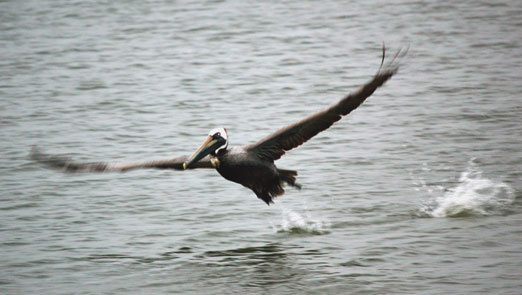Recovering Brown Pelican Populations At Risk From Oil Spill
May 2nd, 2010 Click on the image for a larger view…Unique among the world’s seven species of pelicans, the Brown Pelican [pelecanus occidentalis] is found along the ocean shores only, not on inland lakes. It is the only dark pelican, and also the only one that plunges from the air into the water to catch its food, according to the Cornell Bird Guide.
Shooting it for its feathers and to “protect” fishing caused declines in pelican populations in the first half of the 20th century. Pesticide poisoning, especially by DDT, caused severe declines across the range in the late 1950’s. Populations were virtually extirpated from Louisiana, which still carries the moniker “the pelican state.”
Unlike most birds, which warm their eggs with the skin of their breasts, pelicans incubate their eggs with their feet. They hold the eggs under the webs that stretch from the front toes to the hind toe, essentially standing on the eggs to warm them. This peculiar incubation method made them vulnerable to the effects of the pesticide DDT. The DDT made the eggshells thin, and the incubating parents frequently cracked their eggs.
It was listed as Endangered throughout the range in 1970.
The ban on DDT led to a population recovery, and it was removed from the Endangered Species list in Atlantic Coast states in 1985, and in 2009, the State Bird of Louisiana was removed from Endangered Species List entirely, a major success story for the law.
Breeding numbers in most states are stable or increasing, and the total population in the United States now exceeds historical levels. Yet experts and wild bird lovers now fear for the future of the brown pelican due to the BP oil spill heading toward shore on the Gulf Coast.
While the Brown Pelican is draining the water from its bill after a dive, gulls often try to steal the fish right out of its pouch. They sometimes even perch on the pelican’s head or back and reach in.
The pelican itself, however, is not above stealing fish from other seabirds. It also follows fishing boats and hangs around piers for handouts, like the Pelican Pub on Dauphin Island.

No comments:
Post a Comment
Please keep comments free of vulgarity. Your message will be deleted if not.
This thing is vulgar by it's self.